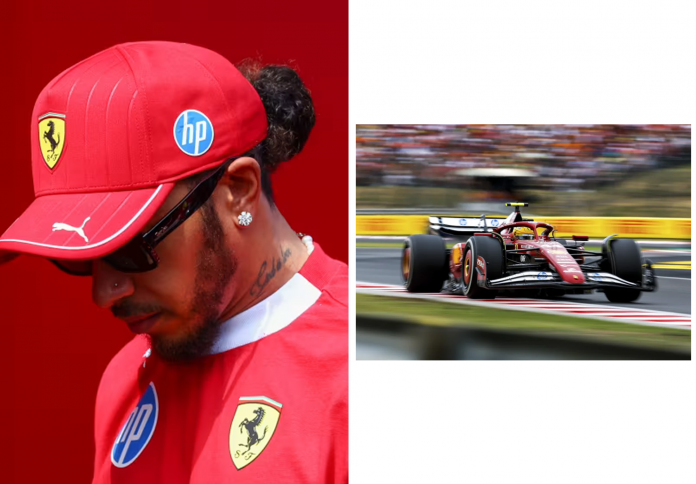The Hungarian Grand Prix became the focal point of a startling personal and professional crisis for Lewis Hamilton, who followed a miserable qualifying session by finishing a disheartening 12th in the race. The seven-time World Champion’s self-criticism reached a damaging peak on Saturday when he told reporters he was “useless, absolutely useless,” even suggesting Ferrari needed to replace him, despite his teammate Charles Leclerc taking pole position. While his post-race statement offered a more measured, team-centric tone—promising to “reset, recharge and come back stronger”—his deeper comments painted a picture of internal strife: “There is a lot going on in the background that is not great,” he admitted. This public display of frustration underscores the challenging nature of his debut season with Ferrari, where monumental pressure and consistently poor results have created a palpable tension between his competitive fire and his current circumstances.
The Self-Inflicted Wound: Hamilton’s Stark Confession
The severity of Lewis Hamilton’s mental and emotional struggle was laid bare during qualifying, where his uncharacteristic self-flagellation dominated the weekend’s headlines.

Starting the Hungarian Grand Prix weekend with high expectations, Hamilton qualified in a dismal 12th position while his teammate, Charles Leclerc, demonstrated the car’s potential by claiming pole. The contrast led to Hamilton’s extraordinary public comments to Sky Sports, where he pinned the blame entirely on himself: “It’s me every time. I’m useless, absolutely useless. The team have no problem… they probably need to change driver.” This profound loss of confidence from a 40-year-old racing legend, who has failed to secure a podium finish in his first 14 Grands Prix with Ferrari, highlights the immense psychological toll of a frustrating debut season. Finishing the race still in 12th place and a full lap behind race-winner Lando Norris only compounded the embarrassment, fueling the narrative that his current struggles are more than just bad luck.
The Lingering Shadow: Unseen Issues and Internal Strife
Following the race, Hamilton elaborated on his frustration, hinting at deeper, unresolved issues within the team structure that are contributing to his performance deficit.
When questioned about his self-critical remarks, the British driver, though affirming his love for racing and the Ferrari team, cut a down-beat figure. He offered a rare glimpse into the behind-the-scenes reality, stating cryptically, “When you have a feeling, you have a feeling. There is a lot going on in the background that is not great.” This admission suggests that his performance troubles are not solely rooted in his driving or the car’s fundamental speed—as evidenced by Leclerc’s pole—but possibly in the tactical, engineering, or internal political aspects of the operation. This hidden complexity separates his struggles from simple performance slumps, adding layers of pressure that the driver, despite his experience, is clearly finding difficult to manage publicly.
The Ferrari Counterpoint: Frustration vs. Demotivation
In contrast to Hamilton’s public anguish, Ferrari Team Principal Fred Vasseur sought to manage the narrative, insisting that the comments were a symptom of intense frustration, not a sign of the driver’s overall capitulation.

Vasseur acknowledged the difficult situation but was confident in his star driver’s dedication. “I don’t need to motivate him. He’s frustrated, but not demotivated, it’s a completely different story,” Vasseur told Sky Sports. The Team Principal defended Hamilton’s harsh language as a natural byproduct of the pressure cooker environment of elite sport, comparing it to emotional outbursts seen in other high-stakes competitions. Vasseur’s primary goal was clearly to protect his driver’s morale and public image ahead of the crucial summer break, emphasizing, “I can understand the frustration… we are all frustrated.” The team’s official statement released after the race reflected this damage-control effort, with Hamilton promising to “reset, recharge and come back stronger,” a message designed to rally the fanbase and deflect the internal strife.
The Tense Season Context: A Championship in Crisis
Hamilton’s Hungarian meltdown is the low point of a frustrating debut season where he has consistently underperformed against both his teammate and the championship leaders.
Midway through the 2025 season, the seven-time champion sits a disappointing sixth in the driver’s championship standings. He is 42 points behind Charles Leclerc and a distant 175 points behind current leader Oscar Piastri. His record shows a consistent failure to maximize opportunities, having failed to make a podium in any of the 14 Grands Prix, with his best result being four fourth-place finishes. Even a potentially volatile incident during the race with former title rival Max Verstappen—where the two cars came close to touching—served only as a distraction, as both drivers avoided punishment and Hamilton failed to improve his position. As F1 heads into its summer break, the key question for Ferrari is not whether Hamilton will return, but whether the team can solve the “lot going on in the background” that is clearly preventing their star driver from finding the performance and competitive peace he needs to fight for victory.










